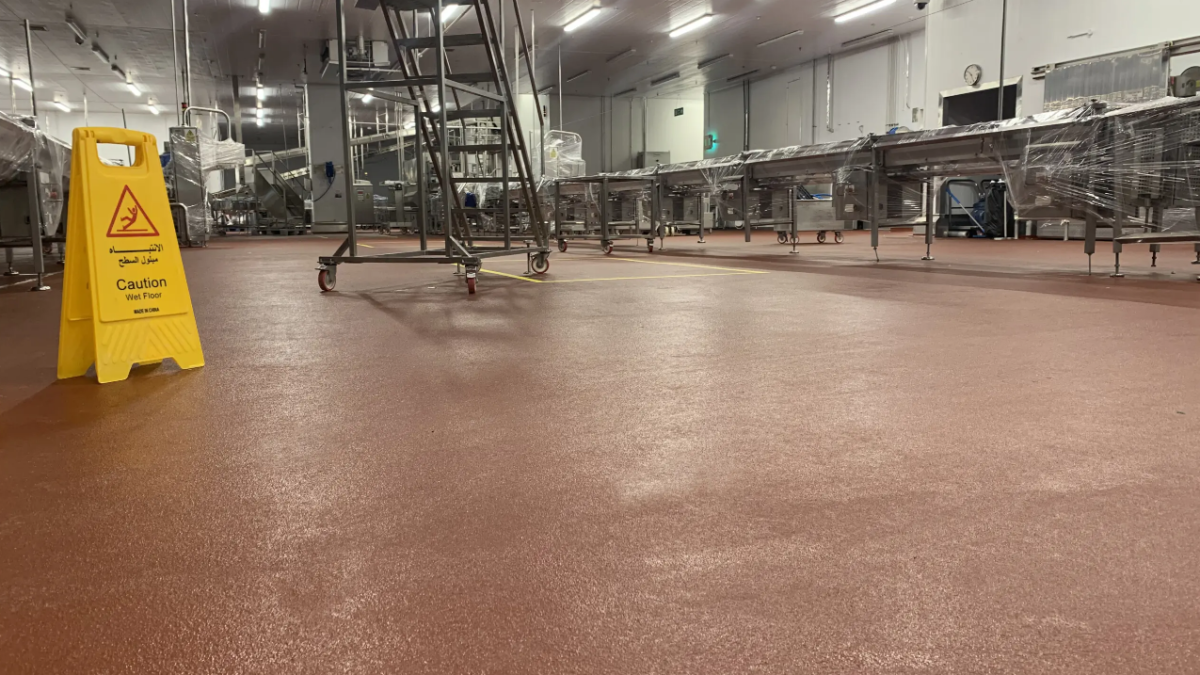A good workplace setting considers hygiene, health, and safety to be off a high priority. No workspace should pose any kind of health hazards to its employees. Employees and brand reputation are of prime importance to any business; hence their health and product quality can be safeguarded with help of most hygienic floorings that are available in the market.
Every industrial space should be concerned with making cleanliness a basic requirement. In a professional setting where food is prepared or packaged and chemicals being handled on regular basis, employees are exposed to potentially dangerous materials where there is a high risk of contamination while handling products for consumption. In such cases the most hygienic flooring is Resin. It is a reliable option for laboratories, food plants, and pharmaceutical settings. All of these spaces can benefit greatly from hygienic Floors. Keep in mind that any place where people are constantly moving around and spread across large spaces, as a result creating a high possibility of contamination, creates a need for spaces that are maintenance friendly.
Traditional flooring materials often contain small cracks, crevices, or joining spaces. These spaces can accumulate dust, dirt, and grease over time. This creates an unhygienic atmosphere and a breeding ground for bacteria. Hygienic Resin flooring has the enormous advantage of being ridge free to enable smooth sweeping of dust, giving it the title of the ‘most hygienic floor’.
Food Plants need to meet the following criteria when selecting the most hygienic floor:
– The Required Level of hygiene for plant floors should be in accordance with food and safety standards.
– The floor should accommodate the characteristics of the ingredients that are processed in the plant, e.g., moisture content, water activity, acidity, viscosity, microbial activity.
– The most hygienic flooring should be constructed with durable, non-porous, watertight, non-absorbent, and anti-slip materials.
– Construction materials should be environment friendly and not generate toxic smells and substances.
– Hygienic Floors surfaces ought to be of even smooth finishes, i.e. free from cracks and open joints that can become bacterial breeding grounds
– Floor surfaces should not be able to absorb grease and grime or food particles that attract infestation by pests.
– Adequate drainage systems should be in place for easy washing and draining of dirty water left by condensation of liquids etc.
– Floors of high moisture processing areas should have a minimum slope or gradient of 2.0% and be installed with at least one 4-inch diameter draining point for every 430 ft of the floor area. This is to prevent the pooling of liquids.
– Floors holding freezing compartments and cold storage spaces should be sloped towards exterior drains so that any liquid leaks can easily be drained off.
– Most hygienic Floors should be able to withstand cleaning agents like chemicals, acids, hot water, and steam cleaning that may be needed for sanitation purposes.
Floors should also be able to withstand normal wear and tear, high-impact equipment, and forklift machinery
– A good hygienic flooring should be able to handle the installation of heavy equipment such as mixers, coolers, heaters, and steamers that operate at really high temperatures.
– The longer it takes to clean any floor the less hygienic it is.
Walls and ceilings in food plants are generally expected to be the areas with the highest exposure to food particle build-up, liquid condensation, and grease thus requiring it to cover them for protection. Hygienic wall cladding is designed to accommodate ease of cleaning, which results in significant benefits for areas where sanitation is of paramount importance again it’s used in spaces such as a kitchen, laboratory, or production and packaging areas. It is also able to withstand heat, cold and damp, practically reducing the maintenance cost down to zero.
Hygienic Resin flooring is most appropriate for many workspaces for good reasons. The most obvious one is that most hygienic floors made of resin are easier to clean than most surfaces that are available on the market. The mixtures are applied to spaces neatly to give a smooth and a tensile floor. As a result, resin creates a porous-free surface that can be sprayed, washed, and disinfected with great ease. It is designed to endure regular upkeep and cleaning that in any other case damage the floors curated out of materials other than durable Resin.
In summary, hygienic flooring is the potential solution to an array of cleanliness problems that have plagued business settings for years together, hygienic floors can avoid potential health and safety disasters in those industries where cleanliness is of utmost importance. However, the advantage of hygienic resin flooring need not be confined only to food and pharma. Every kind of industry space can greatly benefit from sterile and clean environments. Resin hygienic flooring manufacturers worldwide help in installing floors that are elegant, plain or coloured, and decorative to create a pleasing work environment.


